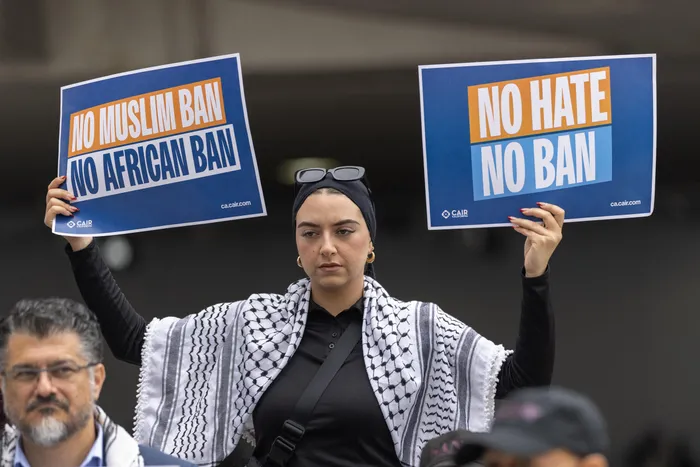Trump's Travel Ban: Perpetuating Discrimination Against African Nations

A protester making her voice heard on the first day of the Trump administration's full ban against travel from 12 countries and a partial ban on seven others, at Los Angeles International Airport (LAX) on June 9, 2025 in Los Angeles, California.
Image: AFP
Dr. Sizo Nkala
United States President Donald Trump proclaimed on June 4 that he was fully suspending the entry into the US of the citizens of 12 countries namely Afghanistan, Burma, Chad, Republic of the Congo, Equatorial Guinea, Eritrea, Haiti, Iran, Libya, Somalia, Sudan, and Yemen.
A partial suspension was imposed on citizens of another group of 7 countries: Burundi, Cuba, Laos, Sierra Leone, Togo, Turkmenistan, and Venezuela. This means that out of the 19 countries subject to full or partial suspension, 10 are in Africa.
This proclamation was issued based on Executive Order 14162 published on January 30 which directed the US Secretaries of State and Homeland Security, the Attorney General and the Director of National Intelligence to identify countries around the world whose vetting and information-screening standards are poor to warrant a partial or full suspension on the admission of their nationals to the US.
The official rationale for this as stated in the proclamation is to enable the US to protect its “citizens from terrorist attacks and other national security or public-safety threats.” Trump reiterated these sentiments while introducing the proclamation saying that his administration “will not allow people to enter our country who wish to do us harm, and nothing will stop us from keeping America safe."
The new travel ban is a rehash of the bans imposed by the first Trump administration between 2017 and 2020. Of the 14 countries that were slapped with bans at that time, 7, namely Nigeria, Sudan, Tanzania, Chad, Somalia, Eritrea and Libya were in Africa. As such, Africa and the Middle East have always dominated the list of Trump’s travel bans.
The criteria used for placing countries on the banned list include lax vetting and information-screening standards, the prevalence of terrorism, and the rate of visa overstays among other things. The new proclamation has ordered the US Immigration Department to reject all visa applications from the concerned countries including those that were submitted before the ban was effected.
There are some double standards because some countries like countries like France, Spain, and the United Kingdom individually have more visa overstays than Libya, Chad, Somalia, Sudan, and Eritrea combined.
The African Union (AU) released a statement in response to the travel bans urging the Trump administration to make decisions in a “manner that is balanced, evidence-based, and reflective of the long-standing partnership between the United States and Africa.”
The statement further encouraged the US government to “consider adopting a more consultative approach and to engage in constructive dialogue with the countries concerned.”The travel ban, which disproportionately affects African countries, is a continuation of the Trump administration’s negative posture towards Africa.
In the last six months, the Trump administration has liquidated the US Agency for International Development (USAID) which was distributing considerable amounts of aid in Africa and helping mitigate poverty. It has also indicated that it will withdraw its funding from Africa’s premier multilateral development bank – the African Development Bank (AfDB).
This will undermine the bank’s efforts to fight poverty and underdevelopment in the continent. Moreover, Trump has also abolished the Presidential Emergency Plan for AIDS Relief (PEPFAR) which gave millions of African citizens infected by HIV access to critical medication. It is widely expected that Trump will not renew the Africa Growth and Opportunity Act (AGOA) when it expires in September.
Since 2000, eligible African countries have been able to access the lucrative US export market duty-free. In this context, the travel ban is not surprising. It is a xenophobic and racist policy that unfairly shifts the blame for the US’ security problems to foreigners from poor countries.
Trump’s campaign for office was partly based on the demonisation of immigrants as criminals and a threat to the US. It perpetuates a negative stereotype of African countries as failed states that are a threat to the United States without any concrete evidence.
This is linked to his outlandish claims of a white genocide in South Africa which he has peddled without any shred of evidence. Such a characterization of Africa from the world’s most powerful office greatly undermines the work that is being done to promote the continent as a safe investment destination.
During his first term, Trump grotesquely described African countries as ‘shithole’ countries. His treatment of Africa shows that he has not changed his mind. He treats Africa with obvious disdain. It is important that Africa develops a common position and becomes more assertive towards the Trump administration. He may have targeted a few countries in the continent but the impact of his statements will be felt beyond those countries.
* Dr. Sizo Nkala is a Research Fellow at the University of Johannesburg’s Centre for Africa-China Studies.
** The views expressed do not necessarily reflect the views of IOL, Independent Media or The African.